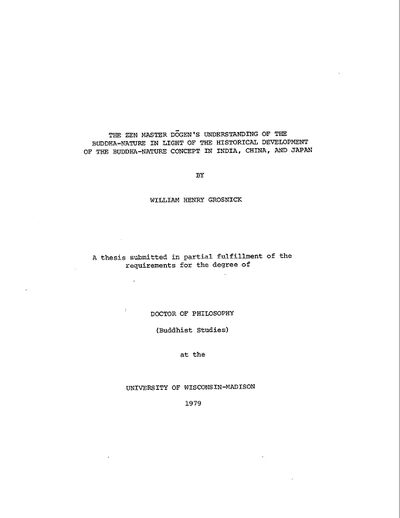The Zen Master Dōgen’s Understanding of the Buddha-Nature in Light of the Historical Development of the Buddha-Nature Concept in India, China, and Japan
< Books
| (4 intermediate revisions by the same user not shown) | |||
| Line 3: | Line 3: | ||
|PersonPage=Grosnick, W. | |PersonPage=Grosnick, W. | ||
|PersonName=William Grosnick | |PersonName=William Grosnick | ||
| + | }}{{Book-person | ||
| + | |PersonPage=Dōgen | ||
| + | |PersonName=Dōgen | ||
}} | }} | ||
|FullTextRead=No | |FullTextRead=No | ||
| Line 20: | Line 23: | ||
***{{i|E. The ''Buddhadhātu'' as the Realm of the Buddha's Wisdom|61}} | ***{{i|E. The ''Buddhadhātu'' as the Realm of the Buddha's Wisdom|61}} | ||
***{{i|F. The Positive Character of the ''Buddhadhātu''|66}} | ***{{i|F. The Positive Character of the ''Buddhadhātu''|66}} | ||
| − | **{{i|Chapter III: The Amalgamation of the ''Tathāgatagarbha'' and ''Buddhadhātu'' Concepts with Yogācārin Teachings|76}} | + | **{{i|Chapter III: The Amalgamation of the ''Tathāgatagarbha'' and ''Buddhadhātu''<br>Concepts with Yogācārin Teachings|76}} |
***{{i|A. Evidence of Yogācārin-''Tathāgatagarbha'' Syncretism|76}} | ***{{i|A. Evidence of Yogācārin-''Tathāgatagarbha'' Syncretism|76}} | ||
***{{i|B. Differences Within the Yogācārin School|81}} | ***{{i|B. Differences Within the Yogācārin School|81}} | ||
| Line 55: | Line 58: | ||
***{{i|H. Time and the Buddha-Nature|224}} | ***{{i|H. Time and the Buddha-Nature|224}} | ||
**{{i|Chapter IX: Dōgen's Understanding of Practice and the Buddha-Nature|228}} | **{{i|Chapter IX: Dōgen's Understanding of Practice and the Buddha-Nature|228}} | ||
| − | A. The Need to Practice the Buddha-Nature | + | ***{{i|A. The Need to Practice the Buddha-Nature|228}} |
| − | B. The Rejection of Stages in Practice and Striving | + | ***{{i|B. The Rejection of Stages in Practice and Striving for<br> Enlightenment|233}} |
| − | for Enlightenment | + | ***{{i|C. Practice as the Completed Activity of the Buddha|236}} |
| − | C. Practice as the Completed Activity of the Buddha | + | ***{{i|D. Everyday Life as the Stuff of Practice|240}} |
| − | D. Everyday Life as the Stuff of Practice | + | ***{{i|E. Wrong Practice|244}} |
| − | E. Wrong Practice | + | ***{{i|F. Practice and the Conception of Original Enlightenment|248}} |
| − | F. Practice and the Conception of Original Enlightenment | + | **{{i|Conclusion: The Significance of Dōgen's Thought Concerning the<br>Buddha-Nature|257}} |
| − | Conclusion: The Significance of | + | **{{i|Appendix: An Annotated Translation of Dogen's ''Shōbōgenzō Busshō''|265}} |
| − | the Buddha-Nature | + | **{{i|Bibliography|323}} |
| − | Appendix: An Annotated Translation of Dogen's | ||
| − | |||
| − | Bibliography | ||
| − | |||
| − | |||
| − | |||
| − | |||
| − | |||
| − | |||
| − | |||
| − | |||
| − | |||
| − | |||
| − | |||
| − | |||
| − | |||
| − | |||
| − | |||
| − | |||
| − | |||
| − | |||
| − | |||
| − | 323 | ||
|AddRelatedTab=No | |AddRelatedTab=No | ||
| + | |StopPersonRedirects=No | ||
}} | }} | ||
Latest revision as of 15:58, 31 July 2020
. . . The present study will have a twofold purpose: 1) to examine the history of the Buddha-nature concept in an attempt to discover a central core of meaning inherent in the concept, and 2) to evaluate Dōgen's view of the Buddha-nature in the light of that central core of meaning. Parts I and II of this work, which examine the doctrinal history of the Buddha-nature concept in India and China, are devoted to the former task, and Part III, which examines Dōgen's thought concerning the Buddha-nature, is devoted to the latter. It is hoped that through the examination of Dōgen's conception of the Buddha-nature in the light of the previous articulation of the concept, it will be possible to form conclusions concerning the significance of Dōgen's thought in Buddhist doctrinal history. (Grosnick, introduction, 7–8)
| Citation | Grosnick, William. "The Zen Master Dōgen’s Understanding of the Buddha-Nature in Light of the Historical Development of the Buddha-Nature Concept in India, China, and Japan." PhD diss., University of Wisconsin-Madison, 1979. |
|---|---|

